Yuxian Jiang
$ρ$-$\texttt{EOS}$: Training-free Bidirectional Variable-Length Control for Masked Diffusion LLMs
Jan 30, 2026Abstract:Beyond parallel generation and global context modeling, current masked diffusion large language models (dLLMs) suffer from a fundamental limitation: they require a predefined, fixed generation length, which lacks flexibility and forces an inevitable trade-off between output quality and computational efficiency. To address this, we study the denoising dynamics and find that the implicit density ($ρ$) of end-of-sequence ($\texttt{EOS}$) tokens serves as a reliable signal of generation sufficiency. In particular, the evolving implicit $\texttt{EOS}$ density during denoising reveals whether the current masked space is excessive or insufficient, thereby guiding the adjustment direction for generation length. Building on this insight, we propose $\textbf{$ρ$-$\texttt{EOS}$}$, a training-free, single-stage strategy that enables bidirectional variable-length generation for masked dLLMs. Unlike prior two-stage approaches--which require separate length adjustment and iterative mask insertion phases while supporting only unidirectional expansion--$\textbf{$ρ$-$\texttt{EOS}$}$ achieves bidirectional length adjustment within a unified denoising process by continuously estimating the implicit $\texttt{EOS}$ density: excessively high density triggers $\texttt{MASK}$ token contraction, while insufficient density induces expansion. Extensive experiments on mathematics and code benchmarks demonstrate that $\textbf{$ρ$-$\texttt{EOS}$}$ achieves comparable performance while substantially improving inference efficiency and token utilization.
SafeWork-R1: Coevolving Safety and Intelligence under the AI-45$^{\circ}$ Law
Jul 24, 2025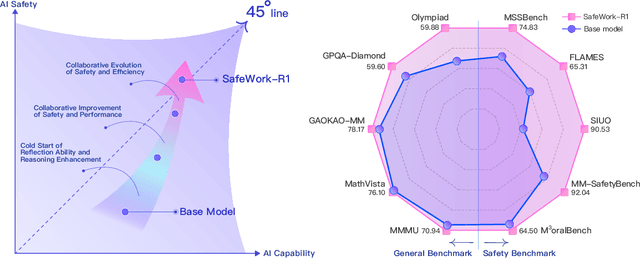
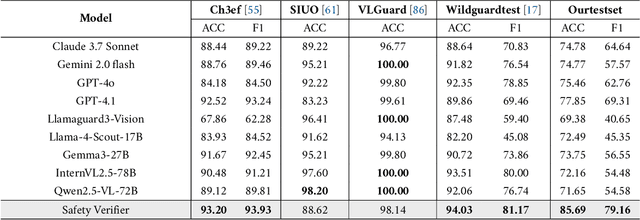
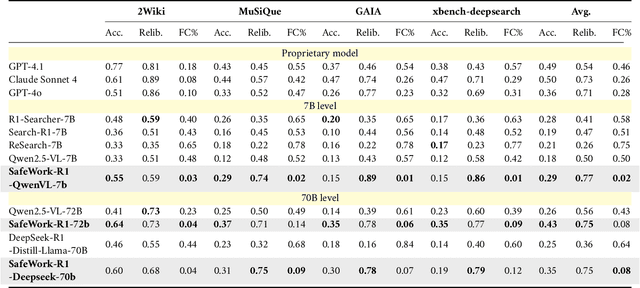

Abstract:We introduce SafeWork-R1, a cutting-edge multimodal reasoning model that demonstrates the coevolution of capabilities and safety. It is developed by our proposed SafeLadder framework, which incorporates large-scale, progressive, safety-oriented reinforcement learning post-training, supported by a suite of multi-principled verifiers. Unlike previous alignment methods such as RLHF that simply learn human preferences, SafeLadder enables SafeWork-R1 to develop intrinsic safety reasoning and self-reflection abilities, giving rise to safety `aha' moments. Notably, SafeWork-R1 achieves an average improvement of $46.54\%$ over its base model Qwen2.5-VL-72B on safety-related benchmarks without compromising general capabilities, and delivers state-of-the-art safety performance compared to leading proprietary models such as GPT-4.1 and Claude Opus 4. To further bolster its reliability, we implement two distinct inference-time intervention methods and a deliberative search mechanism, enforcing step-level verification. Finally, we further develop SafeWork-R1-InternVL3-78B, SafeWork-R1-DeepSeek-70B, and SafeWork-R1-Qwen2.5VL-7B. All resulting models demonstrate that safety and capability can co-evolve synergistically, highlighting the generalizability of our framework in building robust, reliable, and trustworthy general-purpose AI.
Iterative Value Function Optimization for Guided Decoding
Mar 05, 2025Abstract:While Reinforcement Learning from Human Feedback (RLHF) has become the predominant method for controlling language model outputs, it suffers from high computational costs and training instability. Guided decoding, especially value-guided methods, offers a cost-effective alternative by controlling outputs without re-training models. However, the accuracy of the value function is crucial for value-guided decoding, as inaccuracies can lead to suboptimal decision-making and degraded performance. Existing methods struggle with accurately estimating the optimal value function, leading to less effective control. We propose Iterative Value Function Optimization, a novel framework that addresses these limitations through two key components: Monte Carlo Value Estimation, which reduces estimation variance by exploring diverse trajectories, and Iterative On-Policy Optimization, which progressively improves value estimation through collecting trajectories from value-guided policies. Extensive experiments on text summarization, multi-turn dialogue, and instruction following demonstrate the effectiveness of value-guided decoding approaches in aligning language models. These approaches not only achieve alignment but also significantly reduce computational costs by leveraging principled value function optimization for efficient and effective control.
OASIS: Open Agent Social Interaction Simulations with One Million Agents
Nov 26, 2024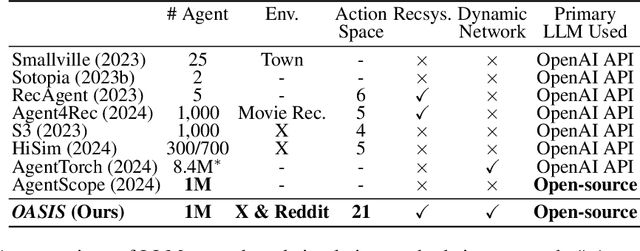
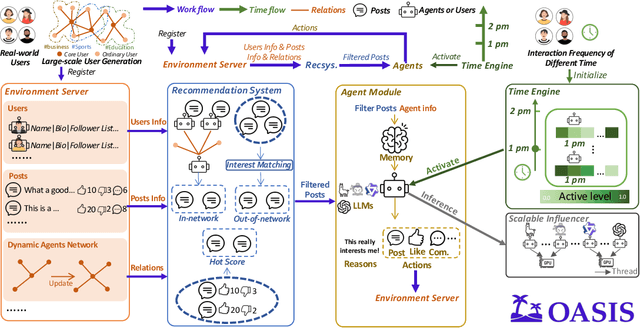

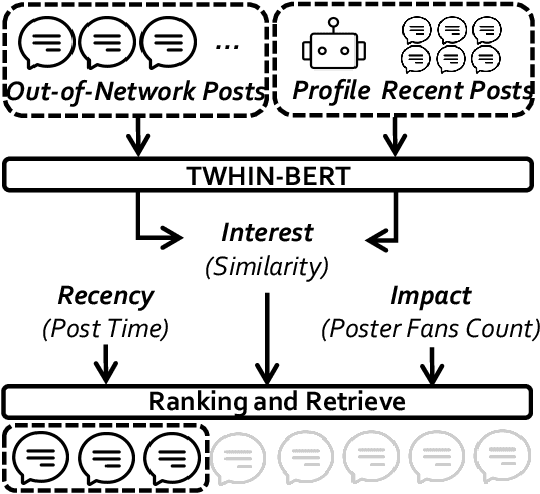
Abstract:There has been a growing interest in enhancing rule-based agent-based models (ABMs) for social media platforms (i.e., X, Reddit) with more realistic large language model (LLM) agents, thereby allowing for a more nuanced study of complex systems. As a result, several LLM-based ABMs have been proposed in the past year. While they hold promise, each simulator is specifically designed to study a particular scenario, making it time-consuming and resource-intensive to explore other phenomena using the same ABM. Additionally, these models simulate only a limited number of agents, whereas real-world social media platforms involve millions of users. To this end, we propose OASIS, a generalizable and scalable social media simulator. OASIS is designed based on real-world social media platforms, incorporating dynamically updated environments (i.e., dynamic social networks and post information), diverse action spaces (i.e., following, commenting), and recommendation systems (i.e., interest-based and hot-score-based). Additionally, OASIS supports large-scale user simulations, capable of modeling up to one million users. With these features, OASIS can be easily extended to different social media platforms to study large-scale group phenomena and behaviors. We replicate various social phenomena, including information spreading, group polarization, and herd effects across X and Reddit platforms. Moreover, we provide observations of social phenomena at different agent group scales. We observe that the larger agent group scale leads to more enhanced group dynamics and more diverse and helpful agents' opinions. These findings demonstrate OASIS's potential as a powerful tool for studying complex systems in digital environments.
OASIS: Open Agents Social Interaction Simulations on One Million Agents
Nov 21, 2024



Abstract:There has been a growing interest in enhancing rule-based agent-based models (ABMs) for social media platforms (i.e., X, Reddit) with more realistic large language model (LLM) agents, thereby allowing for a more nuanced study of complex systems. As a result, several LLM-based ABMs have been proposed in the past year. While they hold promise, each simulator is specifically designed to study a particular scenario, making it time-consuming and resource-intensive to explore other phenomena using the same ABM. Additionally, these models simulate only a limited number of agents, whereas real-world social media platforms involve millions of users. To this end, we propose OASIS, a generalizable and scalable social media simulator. OASIS is designed based on real-world social media platforms, incorporating dynamically updated environments (i.e., dynamic social networks and post information), diverse action spaces (i.e., following, commenting), and recommendation systems (i.e., interest-based and hot-score-based). Additionally, OASIS supports large-scale user simulations, capable of modeling up to one million users. With these features, OASIS can be easily extended to different social media platforms to study large-scale group phenomena and behaviors. We replicate various social phenomena, including information spreading, group polarization, and herd effects across X and Reddit platforms. Moreover, we provide observations of social phenomena at different agent group scales. We observe that the larger agent group scale leads to more enhanced group dynamics and more diverse and helpful agents' opinions. These findings demonstrate OASIS's potential as a powerful tool for studying complex systems in digital environments.
S-Agents: self-organizing agents in open-ended environment
Feb 08, 2024



Abstract:Leveraging large language models (LLMs), autonomous agents have significantly improved, gaining the ability to handle a variety of tasks. In open-ended settings, optimizing collaboration for efficiency and effectiveness demands flexible adjustments. Despite this, current research mainly emphasizes fixed, task-oriented workflows and overlooks agent-centric organizational structures. Drawing inspiration from human organizational behavior, we introduce a self-organizing agent system (S-Agents) with a "tree of agents" structure for dynamic workflow, an "hourglass agent architecture" for balancing information priorities, and a "non-obstructive collaboration" method to allow asynchronous task execution among agents. This structure can autonomously coordinate a group of agents, efficiently addressing the challenges of an open and dynamic environment without human intervention. Our experiments demonstrate that S-Agents proficiently execute collaborative building tasks and resource collection in the Minecraft environment, validating their effectiveness.
 Add to Chrome
Add to Chrome Add to Firefox
Add to Firefox Add to Edge
Add to Edge